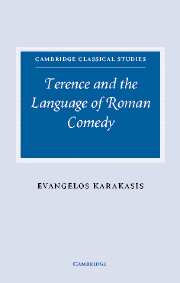Book contents
- Frontmatter
- Contents
- Acknowledgements
- Conspectus siglorum
- Introduction
- Part I Linguistic differentiation in Terence
- 1 Colloquialisms
- 2 Archaisms
- 3 Senilis μακρολογία and περισσολογία
- 4 Hellenisms
- 5 Features of elevated language
- 6 Idiolect
- 7 Plautus in Terence: the case of Eunuchus
- Part II Linguistic and stylistic unity in Roman comedy
- Bibliography
- Index locorum
- Index nominum et rerum
3 - Senilis μακρολογία and περισσολογία
Published online by Cambridge University Press: 22 September 2009
- Frontmatter
- Contents
- Acknowledgements
- Conspectus siglorum
- Introduction
- Part I Linguistic differentiation in Terence
- 1 Colloquialisms
- 2 Archaisms
- 3 Senilis μακρολογία and περισσολογία
- 4 Hellenisms
- 5 Features of elevated language
- 6 Idiolect
- 7 Plautus in Terence: the case of Eunuchus
- Part II Linguistic and stylistic unity in Roman comedy
- Bibliography
- Index locorum
- Index nominum et rerum
Summary
Introduction
A second group of linguistic phenomena associated with senile speech, occurring again both at the lexical and syntactical levels, seems to be long-winded forms of expression, marking the language of old persons as slow or ponderous.
Ancient theorists have often remarked on the prolix character of senile speech. Aristotle in the Rhetoric (B 1390a6–9) claims that old people are characterised by ἀδολεσχία. Cf. also Demetr. Eloc.8 οἱ γέροντεs μακρολόγοι διὰ τὴν ἀσθένειαν, Longin. Sublim. 9.12 ἴδιόν ἐστιν ἐν γήρᾳ τὸ φιλόμυθον, Cic. Sen.55 senectus est natura loquacior (see also Isoc. Panath. 88, D. Chr. Euboicus 1 πρεσβυτικὸν πολυλογία, Maximian 1. 204 o sola fortes garrulitate senes).
Donatus often comments on the garrulousness of Terence's old people. Their loquacity, according to the ancient scholiast, results in πολυλογία μακρολογία, or even περισσολογία, involving the use of more words than are necessary to express a thought. On Ad. 68, where Micio says mea sic est ratio et sic animum induco meum, Donatus remarks: senilis μακρολογία. Furthermore, at Eun. 971–3 the senex of the play says Ex meo propinquo rure hoc capio commodi: neque agri neque urbis odium me umquam percipit. ubi satias coepit fieri commuto locum. Donatus, commenting on the second sentence in the quotation, points out its superfluous character. The first two lines, according to the scholiast, were sufficient to express the idea. He adds, however, sed hic ἐνάργεια est senilis eloquii, faceti et garruli simul.
- Type
- Chapter
- Information
- Terence and the Language of Roman Comedy , pp. 62 - 82Publisher: Cambridge University PressPrint publication year: 2005



